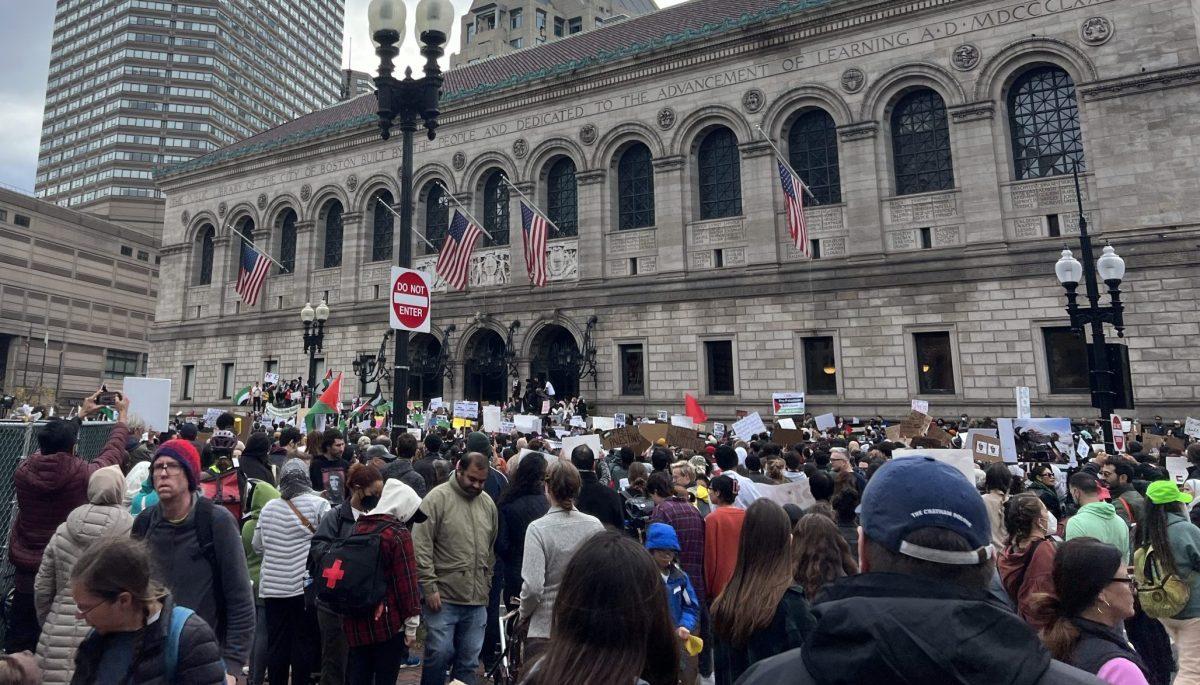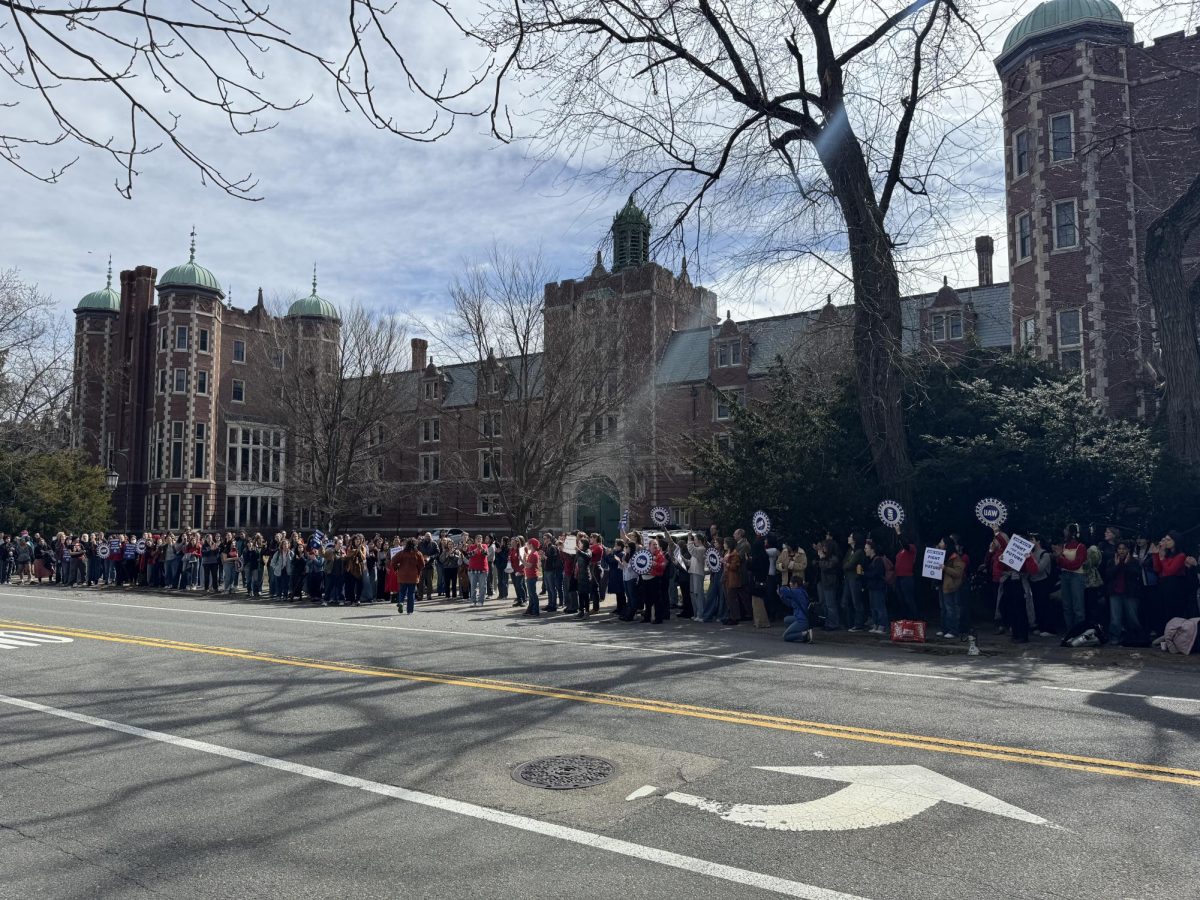Around 6:30 a.m. on Saturday, Oct. 7, Hamas launched a surprise offensive attack out of Northern Gaza into Israel, making it the deadliest day in Israel’s history (according to the Council of Foreign Relations). The attack occurred while many Jewish Israelis were celebrating Shemini Atzeret, a major holiday in Judaism, slowing the reaction time of Israeli forces. The attack included both air raids targeting major Israeli cities, including Tel Aviv, and a ground invasion of Southern Israel. In the attack, 1,300 people were killed [according to the US Gov] and a presumed 200 people were taken hostage (defined by the 1949 Geneva Convention as a war crime). At 11:35 a.m. that day, Israel’s Prime Minister, Benjamin Netanyahu, made a statement declaring war on Hamas, the controlling political party of Gaza. Hamas, an acronym for Harakat al-Muqawama al-Islamiay (Islamic Resistance Movement), won the Palestinian legislative election in 2006 with 56% of the overall vote under the list name Change and Reform; however, no elections have been held since then. In 2007, Hamas took control of the Gaza Strip through force and has run Gaza as an autocratic one-party state since then.
Since Oct. 7, Israel has responded with air raids that have, as of Oct. 19, killed 3,478 Palestinians, CNN reports. This number includes those killed in the al-Ahli Arab Hospital attack, which Hamas blames on an Israeli air strike. Israel continues to deny this assertion and instead maintains that the blast was caused by an errant rocket misfire by another group, Palestinian Islamic Jihad, who also deny firing the missile. President Biden shared the United States’ support for Israel’s assertions, stating, “Based on the information we’ve seen to date, it appears the result of an errant rocket fired by a terrorist group in Gaza.” Marc Galasco, a former Pentagon intelligence analyst, says that the damage is inconsistent with a standard Israeli airstrike, but there is not yet conclusive evidence of who perpetrated the strike.
Initially after the attack, Hananya Naftali, social media advisor for Israeli Prime Minister Benjamin Netanyahu, allegedly tweeted “BREAKING: Israeli Air Force struck a Hamas terrorist base inside a hospital in Gaza. A multiple number of terrorists are dead. It’s heartbreaking that Hamas is launching rockets from hospitals, Mosques, schools, and using civilians as human shields. #Hamas_is_ISIS.” The alleged tweet was immediately deleted, and no laudable sources have conclusively confirmed its content. Soon after, Naftali apologized in another tweet, saying, “I mistakenly shared this information in a since deleted post in which I referenced Hamas’ routine use of hospitals to store weapons caches and conduct terrorist activity. I apologize for this error … It is known that Hamas is using civilians as human shields, it is a war crime and a crime against humanity. This should be the focus.” In response to Naftali’s social media activity, Palestinian Ambassador to the UN Riyad Mansour stated in a press conference, “He [Netanyahu] is a liar. His spokesperson and digital spokesperson tweeted that Israel did the hit thinking that there is around this hospital a base for Hamas and then he deleted that tweet.”
On Friday, Oct. 13, Israel called for the evacuation of 1.1 million Palestinians living in Northern Gaza, as Israel prepares for a ground invasion. The Al-Ahli Arab Hospital was in the South of Gaza, past the evacuation zone that Israel called for, surprising Palestinian civilians.
The death toll in Israel has reached over 1,400 people, most of whom were killed in the Oct. 7 attack. Since then, in Gaza, over 5,000 Palestinians have been killed, and Israel has arrested 4,000 laborers from Gaza and more than 1,000 people in the occupied West Bank, according to Palestinian officials, doubling the number of Palestinian political prisoners in Israeli prisons and detention centers.
Since the attacks on Oct. 7, the United States’ government has made multiple statements on the conflict. Most notably, President Biden visited Israel on Wednesday, Oct. 18, and pledged the United State’s historic and continued support of Israel in a press conference. Throughout, Biden reiterated that Israel is “not alone” and that the United States is “going to stand by [Israel’s] side now.” Biden also condemned the actions of Hamas, stating “Hamas committed atrocities … There’s no rationalizing it, no excusing it, period.” Biden ended the press conference collectively calling on people to “keep pursuing peace, [we] must keep pursuing a path so that Israel and the Palestinian people can both live safely in security, in dignity, and in peace,” referring to a two-state solution.
On Oct. 18, the United Nations proposed a resolution to condemn all violence against civilians and give humanitarian aid to the Palestinian people. This proposition responds to the humanitarian crisis in Gaza due to Israel’s strict blockade: “I have ordered a complete siege on the Gaza Strip. There will be no electricity, no food, no fuel, everything is closed,” says Israeli Defense Minister Yoav Gallant. Of the 15 UN members, 12 members approved the resolution, Britain and Russia abstained from voting, and the United States was the only member to veto the resolution. Linda Thomas-Greenfield, the US ambassador to the UN, defended the United States’ decision, stating, “We are on the ground doing the hard work of diplomacy … we believe we need to let that diplomacy play out.” Thomas-Greenfield also expressed that “the United States is disappointed [that] this resolution made no mention of Israel’s rights of self defense.”
President Paula Johnson issued a statement on Oct. 11, following the attacks in Israel. In the email she called for “respect and tolerance” of different viewpoints and she “condemned the taking of hostages and … terrorizing of civilians.”
Other than that, administration has said little on the issue, and student opinions are voiced mostly on social media platforms, such as Instagram and Sidechat. On Saturday, Oct. 21, there was a small protest on the Wellesley campus during Paula Johnson’s welcome speech for family and friends weekend.
Other college campuses in the area, such as MIT, Harvard and Northeastern, have held vigils and memorials commemorating lives lost, as well as rallies and marches in defense of Palestine.
Wendy* stated, “I think the inclination of the higher ups on campus is to just stay quiet so as to not provoke any protests. The quiet on campus is unsettling. It feels like something is going to happen.”
Wanda, an Arab student, has encouraged students to voice their opinions, saying, “We [Wellesley students] can talk about colonialism when it happened 50 years ago, but when it’s actually happening now, people are too afraid to say anything. [Some people] have the audacity to say, if you’re not Israeli or if you’re not Palestinian, you shouldn’t even have an opinion on the subject. We look back on certain events and wonder how civilians were passive, [yet] we are seeing it happen right now on our campus.”
Students have conveyed an overwhelming feeling of grief over the loss of life in the war.
Wren, a Jewish student, expressed, “There is grief, there is anger, and there is also rage that this horrible tragedy is being used to justify an even worse tragedy. Everyone I know and everyone I talk to thinks that what is going on in response — the bombings of Gaza and the cutting off of humanitarian aid — is completely unacceptable and contrary to everything that Judaism stands for.”
Wren wants to remind everyone on campus to consider what other people are going through during this time of grief. “There are people on this campus who are in mourning right now, who do know people who were killed.”
Winter, a Jewish Israeli student, conveyed the need for observers to humanize the people in the conflict. “People often tell me, ‘you can’t be pro-Israel and pro-Palestine, you have to choose one, you have to pick a side’ and I’m like, ‘you cannot be morally right without being pro-both’ … You cannot tell me that one side deserves a country and the other side doesn’t. Both communities have ties to the land.”
In relation to the death and violence occurring in Gaza, Winter continued , “I personally don’t want to see anybody hurt … Humanity comes first … The PA [Palestinian Authority] and Hamas do not represent the Palestinian people the way the Palestinian people deserve to be represented.”
Although students are grieving, many remain hopeful that there are pathways for discussion.
Wendy emphasized the need for discussion. She stated, “People often polarize the issue. I think there is a middle ground. And I think that there is a lot to learn from both the Israeli perspective and the Palestinian perspective.”
Willow, a Jewish pro-Palestinian student reminds students to understand the current events from multiple different positions stating, “When you’re never exposed to what is actually going on and you don’t have the full picture, you don’t really have the ability to make your own opinion.”
Wren commented, “There’s so much violence and it becomes a cycle, and sometimes it can feel self-perpetuating, but it can be broken.”
As a resource for students who wish to learn more about the history of the creation of Israel and the ensuing conflict in the territory, faculty members have put together a collection of sources which can be found in this greater compilation of resources for students. Faculty would like to note that they did not make “any effort to compile resources that are ‘balanced’ or ‘neutral’ … These are simply sources that [are] useful or compelling, both in terms of providing explanations and offering perspectives that could use amplification.”Wellesley College offers courses that focus on this topic, available in Spring 2024, and listed in the resource compilation. President Johnson also shared in an email on Friday night that “two professors who specialize in the history of the region and in global politics are partnering with the Albright Institute to lead a teaching session for the community next week.”
The Clapp Library now houses a collection of resources centered around Israel/Palestine. This collection was put together in the last two weeks by Sarah Moazeni, research and instruction librarian for history, Jewish studies, Middle Eastern studies, peace and justice studies, and religion (among others). This project was in collaboration with several of her colleagues, notably Daria Hafner, librarian for political science, and professors from the peace and justice, religion and political science departments.
The goal of this collection, Moazeni says, is to encourage people to “not believe everything they read and instead read more.” By including literature and poetry in addition to the many books on history and media literacy, Moazeni hopes “to remind people to humanize the people in the conflict.”
Students are cautioned to be aware that the available selection at any given time may not be accurately representative of the full collection, as many of the resources have been checked out already. On the table, students will find QR Codes to both the full list of materials in the collection (including those currently checked out) and a form where students can suggest more materials.
Grief, rage and confusion are just some of the many feelings that students have expressed in the wake of the recent events in Gaza and Israel. There are many services provided on campus which students may seek for guidance and support at this time, including the Stone Center Counseling Services and the Office for Religious and Spiritual Life.




